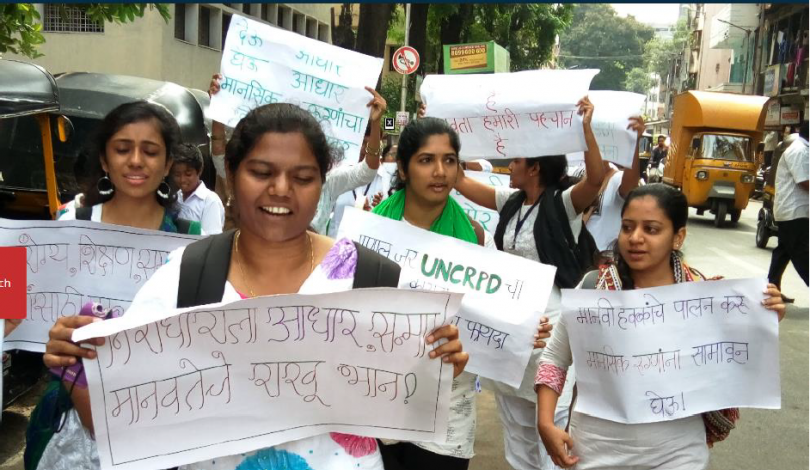Mental health and psychosocial disability are key to sustainable development and humanitarian responses yet are woefully neglected areas. A mere 1% of health funding is spent on mental health in low- and middle-income countries. Disability-inclusive development has so far failed to reach people with psychosocial disabilities, such that similarly low investments have been made within community-based inclusive development initiatives for people with psychosocial disabilities. We echo previous and mounting calls for increased action and investment in mental health and inclusion of people with psychosocial disability in international development efforts within the Asia and Pacific region. A human rights approach to mental health and psychosocial disability is needed. That is, one that recognises that people are disabled by the interaction of their functioning and health conditions, and unsupportive social and physical environments. We see psychosocial wellbeing as a universal development strategy and outcome.
Despite the development of international conventions and goals over the past decade, people with psychosocial disabilities across the world confront discriminatory laws and policies, stigmatising attitudes, discrimination in development, social exclusion, and violence. Families affected by psychosocial disability are more likely to become poor, and equally, poverty and social inequalities can negatively impact mental wellbeing.
Below we offer some best practice recommendations, based on international programs and research, for development practitioners from all sectors to change the current confronting and unacceptable situation for people with psychosocial disabilities throughout the Asia and Pacific region.
1. Address widespread stigma and misunderstanding about psychosocial disability
Negative beliefs and associated prejudice drive much of the exclusion of people with psychosocial disabilities in communities and development efforts. Often psychosocial disability is viewed solely as a health issue; something to be ‘fixed’, shunned, or shackled away from view. Dedicated human rights and psychosocial training, led by people with psychosocial disability, is needed to help practitioners and the communities they work in, and with, to understand and negotiate the relationships between mental health and disability. Efforts need to go beyond just raising awareness or improving access to treatment, to build lasting sociocultural contextual understandings of and attitudes towards psychosocial disability.
2. Create collective voice and advocacy about psychosocial disability
Changing structurally-maintained exclusion must be led by people with psychosocial disabilities themselves. Supporting people with psychosocial disabilities to use collective voice can be achieved by encouraging existing disabled peoples organisations (DPOs) and support groups to consider the needs and interests of people with psychosocial disabilities through training, support for carrying out situational analyses, and providing linkages between organisations in the region. Working with psychosocial disability specific movements is also key. Collaborating with less ‘official’ networks of people with psychosocial disabilities will help to support emerging coalitions. Mentorship and South-to-South collaboration between psychosocial DPOs from different countries can be facilitated through TCI Asia Pacific who advocate for the unique experiences of people with psychosocial disabilities in the region.
3. Take a family-centred approach to inclusive development
Family relationships are a core building block for community functioning in many parts of the Asia Pacific. Families affected by psychosocial disability experience stigma – and often perpetuate stigma – and have their livelihoods affected. Family-centred approaches, including family support and self-help groups, and peer educators are needed to build a family’s understanding of and strategies to approach psychosocial disability to decrease family tension. Strengthening family relationships is particularly important for enhancing children’s wellbeing, and can be achieved through programmes that build positive parenting strategies and family understanding.
4. Inclusion in livelihood generation opportunities
Creating opportunities for people with psychosocial disabilities and their families to participate in livelihoods is critical. Targeting people with psychosocial disabilities and their families for livelihood generation through development programs can alleviate poverty and enable inclusion in communities. Ensuring that economic empowerment and education programs include focus on reducing barriers to access for people with psychosocial disability, including addressing harmful attitudes of staff and employers, is integral to them having the resources to participate in civil society activities. Good examples from the region include self-help groups, skills training, start-ups, and small business training.
5. Address gender inequalities
Women and girls with psychosocial disabilities are particularly vulnerable to violence and exclusion from society, education and employment. Gender-lens development programming is strengthened by integrating the broader concept of mental health and wellbeing. Initiatives that target women’s empowerment, leadership, skill building, and health initiatives should include specific provisions to increase access for women with psychosocial disabilities. For example, the ‘Psychosocial support in Gender Based Violence Prevention and Response project’, implemented by the Centre for Mental Health and Counselling (CMC)-Nepal and UNFPA in Nepal, works to address the psychosocial needs of the survivors and their families, and perpetrators.
6. Community-based psychosocial support
Community-based psychosocial support involves ensuring people with psychosocial disabilities have equal access to opportunities, including jobs, health services, addressing housing needs, skill development, food, water security and sanitation to enable persons to live in communities on an equal basis with others. The Seher program in Pune, India mobilises families and communities around wellbeing along the eight domains of recovery: self-care, nutrition, addressing social and community justice issues, family empowerment, enabling immediate group support, mobilising social capital, comprehensive health care, and linking the person with a variety of support systems and services. The solution lies in providing a wide matrix of choices to customise mental health interventions to address a diversity of needs.
Without intentional actions like those described above, people with psychosocial disability and mental health issues will continue to be left behind in development efforts. International development work will be enriched and enabled through consideration of mental health and the inclusion of people with psychosocial disabilities. The time for action on mental health and psychosocial disability is now.



Leave a Comment